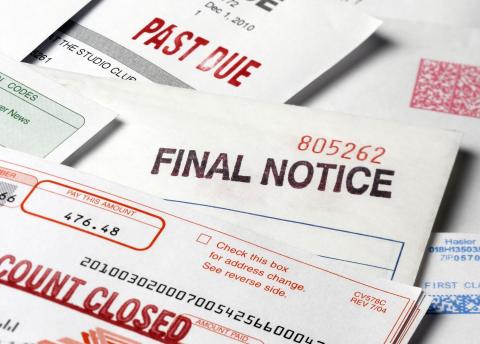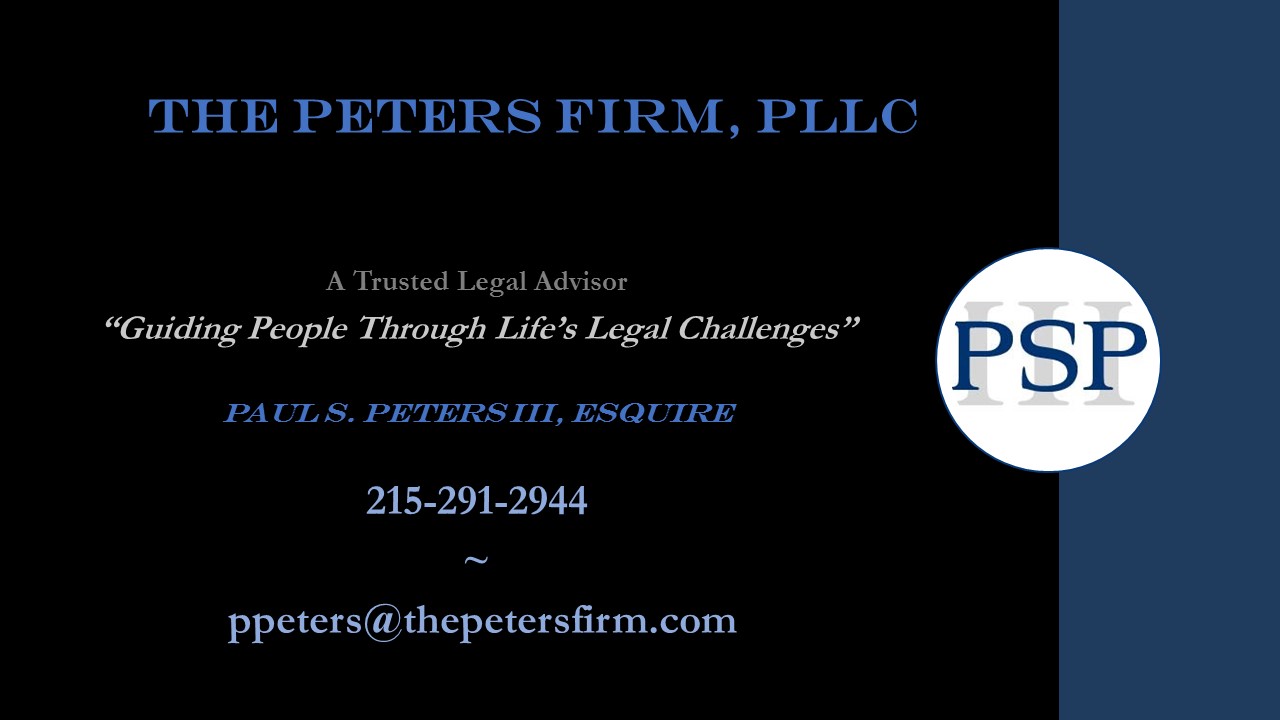
Pennsylvania’s Consumer Protection Laws Against Debt Collectors
Pennsylvania Consumers have specific Rights Regarding the Actions of Creditors and Debt Collectors
You may experience a time in your life when unfortunate circumstances create an inability to pay and manage all of your bills and debts. Maybe you or your spouse lost a job, or are ill and unable to work or have mounting medical bills, or you may be going through a divorce. Maybe you simply forgot to pay a bill, lost a bill, or are the victim of identity theft. Currently, the COVID-19 pandemic may create this issue due to a job loss.
If faced with issues stemming from COVID-19, please see my blog post on programs to assist with bills and the priority of bills.
Whatever the reason, once creditors/debt collectors begin to call, email, send mail, or file lawsuits, you as an individual have protections under both state and federal laws.
There are two Federal Laws and one Pennsylvania Law you should be aware of. The Federal laws are the Fair Credit Billing Act and the Fair Debt Collections Practices Act. In Pennsylvania, the law is the Fair Credit Extension Uniformity Act.
Fair Credit Billing Act
This Federal Law provides you rights regarding billing charges and any dispute or issue you discover regarding charges. This law gives you the right to file a written challenge within sixty (60) days of the billing error. Once a written challenge is made, the creditor has thirty (30) days to acknowledge your dispute, and then ninety (90) days to make a final decision.
If the creditor does not provide a final decision in ninety (90) days, your challenge is then deemed valid and any error you claim must be corrected.
The types of errors this law pertains to are:
- Charges not made by a consumer
- Charges in wrong account
- Charges for goods or services not received by the consumer
- Charges for goods not delivered as agreed
- Charges for goods that are damaged upon receipt
- Failure to properly reflect payments or credits to an account
- Calculation of interest/fees errors
- Charges the consumer wants clarified
- Product or goods not as described (significant difference)
For example, if Capital One were to mail you a letter or call you about an alleged debt and you believe it is an error (you did not make any charges, you paid the bill, or you never had a Capital One credit card), you simply have to tell them in writing that you dispute the debt and demand written proof/documentation of your alleged obligation to pay the debt.
This law’s purpose is to protect you from billing errors that can cause significant financial loss, unfairness in dealing with merchants, or wrongful damages to your credit report and score. It also creates a clear and streamlined process for challenging billing errors and receiving a response.
The Federal Fair Debt Collections Practices Act and Pennsylvania’s Fair Credit Extension Uniformity Act (FCEUA)
The Fair Debt Collection Practices Act (FDCPA) establishes a set of guidelines debt collectors must follow when attempting to collect a debt via phone, email, mail, or in person. Additionally, it creates a remedy process for when a debt collector violates the law.
For the FDCPA it is important to understand the difference between a creditor and a debt collector. A creditor is the original party/first party you owe a debt to. For example, a doctor’s office, Citibank, Discover Card, Comcast Cable, or Capital One. A debt collector is a company whose primary business is collecting a creditor’s debt. A debt collector may be hired by a creditor to collect a debt, or it may purchase the rights to own and collect a debt owed to a creditor. Examples of debt collectors are Midland Funding, Portfolio Recovery, Asset Acceptance, Allied Interstate, and LVNV Funding, just to name a few. Debt Collectors are referred to as third-party creditors.
For example, a doctor’s office may sell a couple hundred accounts to Allied Interstate, and Allied Interstate now owns the debts and may act to collect them (mailings, phone calls, or lawsuits). In another case, the doctor’s office may just hire Allied Interstate to try to collect outstanding bills and pay Allied Interstate a percentage of any amount recovered.
This distinction between creditor vs. debt collectors is important because the FDCPA only applies to debt collectors. In Pennsylvania, the government passed its own law, The Fair Credit Extension Uniformity Act, affirming the FDCPA guidelines as to debt collectors dealing with Pennsylvania residents; however, the law also extended the FDCPA guidelines to apply to creditors collecting debts from Pennsylvania residents. Therefore, Capital One as a creditor must follow the same debt collection rules as Allied Interstate, a debt collector.
In Pennsylvania, debt collectors must identify themselves to you in every verbal or written communication and state, “this communication is from a debt collector, and that any information obtained may be used in the collection of the debt”
They must also notify you of your right to dispute the debt in 30 days and demand proof that you may owe the debt.
The following actions or representations are prohibited by debt collectors pursuant to the FDCPA and by creditors pursuant to Pennsylvania’s Fair Credit Act:
- Calling you before 8 am and after 9 pm
- Failure to cease communication upon your request
- Calling you repeatedly or continuously with the intent to annoy, abuse or harass
- Call you at your place of employment
- Contact you if you are represented by an attorney
- Calling you after validation of the debt has been requested
- Misrepresentation or deceit, such as claiming they are connected to law enforcement
- Publishing your name or address
- Threatening violence
- Threatening arrest or illegal actions (ex. Taking custody of children or garnishing wages if in Pennsylvania)
- Using abusive and profane language
- Communication w/ third parties (parents, neighbors, etc.) other than for the purpose of gaining information on your location
- Revealing to any third party that you owe a debt
- Representing that you committed a crime
- Filing lawsuits against a consumer in any place other than where the consumer lives
- Providing verification of a debt upon receipt of a dispute from the consumer
When dealing with a debt collector it is important to understand your right to dispute the debt and demand proof. Many instances when debt collectors purchase debts from creditors, the proper paperwork is not executed, or the debt collector does not obtain the necessary documentation. Therefore, the debt collector cannot prove in court the debt is owed, or they have a right to collect the debt. Therefore, it is always worth the time to challenge a debt collector’s right to seek money from you for an alleged debt.
The most shocking and egregious action I have ever dealt with in a debt collection matter was when a client of mine received a phone call from a debt collector regarding an old credit card account. The debt collector told my client that people were outside her house from the collection agency ready to legally enter the client’s house and take custody of her children to place them in foster care and adopt them out if my client did not make a payment over the phone. The debt collector also sent my client an email making the same threat while she was on the phone with them. The debt collector identified itself as being a part of the Department of Justice and used the Department of Justice’s seal in their email.
If debt collectors or creditors violate any regulations pursuant to the above laws, you may be able to file a lawsuit against the debt collector or creditor and obtain money damages and payment of attorney’s fees due to the violations.
If you believe a debt collector or creditor has acted illegally toward you in the attempt to collect a debt or allege you owe a debt, contact the trusted and experience debt collection defense attorney, Paul S. Peters III, Esquire at:
215-291-2944
ppeters@thepetersfirm.com
TRUSTED AND AGGRESSIVE PENNSYLVANIA
DEBT COLLECTION DEFENSE ATTORNEY
If you are being tormented by a debt collector in any of the following counties, contact the trusted and experienced Montgomery, Philadelphia, Bucks, Delaware, Chester, Lehigh, Lancaster, Northampton, Berks, Adams, Cumberland, Dauphin, Franklin, Fulton, Huntington, Juniata, Lebanon, Mifflin, Perry, Snyder, York, Bradford, Cameron, Centre, Clinton, Lycoming, Montour, Northumberland, Potter, Sullivan, Tioga, Union, Carbon, Columbia, Lackawanna, Luzerne, Monroe, Pike, Schuylkill, Susquehanna, Wayne, and Wyoming Debtor Collection Defense attorney:
Paul S. Peters III, Esquire at:
215-291-2944
ppeters@thepetersfirm.com



